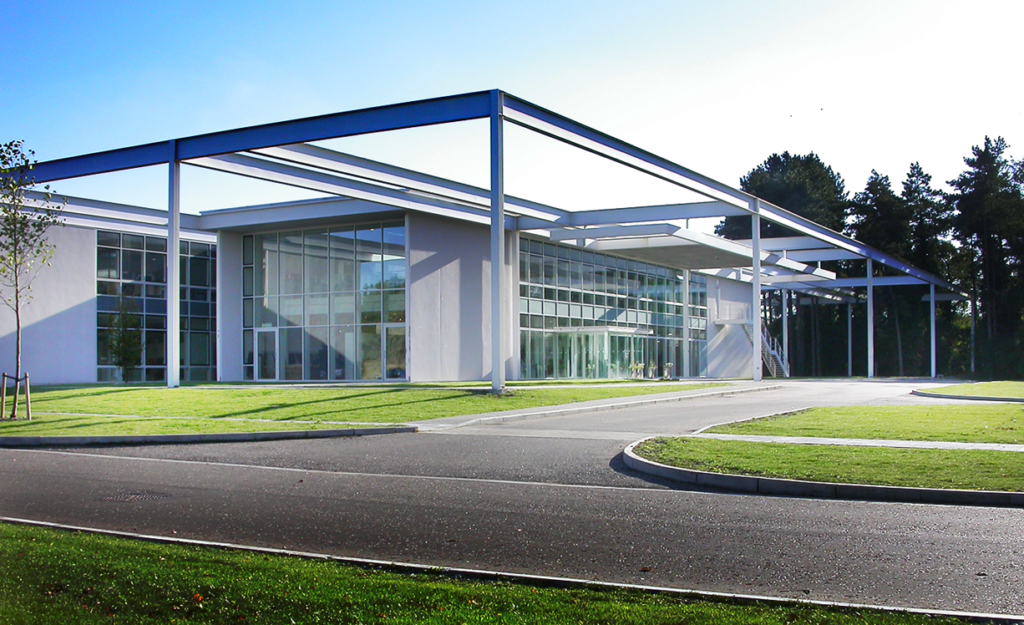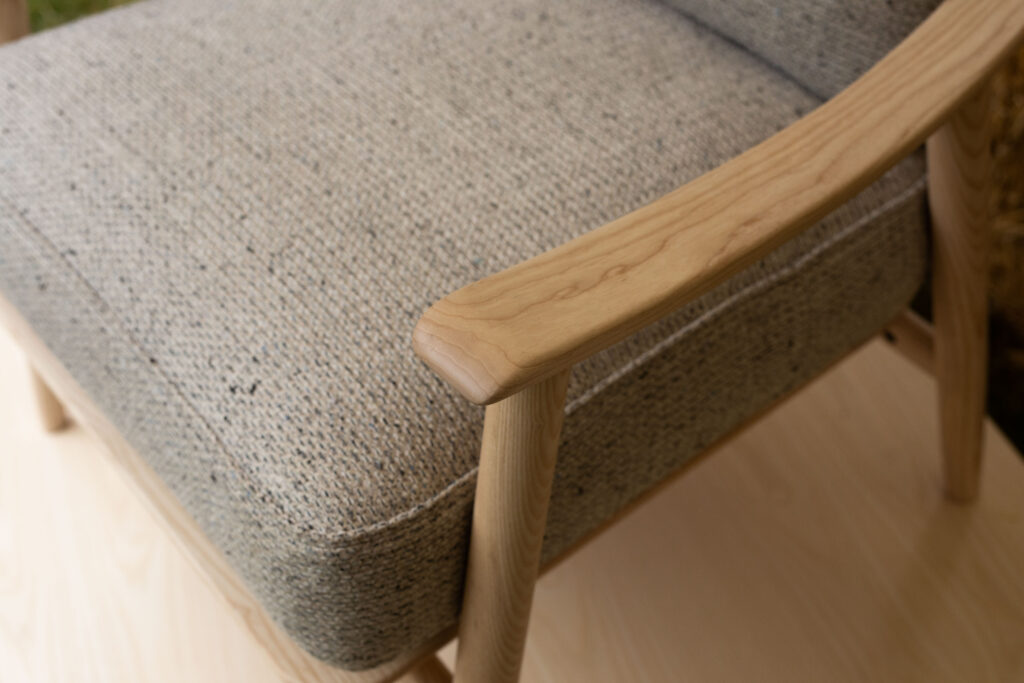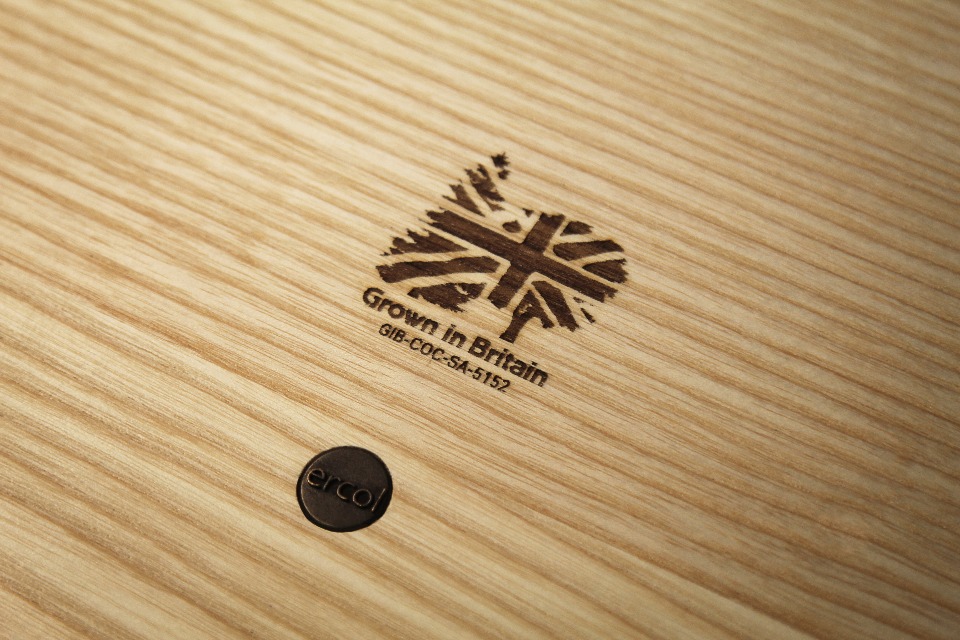In the heart of Buckinghamshire, a remarkable transformation is taking place. The century-old furniture maker, ercol, has partnered with Grown in Britain and Tyler Hardwoods in a pioneering project supported by the Woods into Management Forestry Innovation Fund.
The UK is currently the second largest importer of wood, importing 73% of timber. 85% of locally sourced hardwood is being burned as fuel while manufacturers import wood for furniture making. In a market worth hundreds of millions of pounds and growing, this is a challenge for the industry to address.
It also presents a great opportunity for a shift towards home-grown timber for the furniture industry, particularly as customers are becoming more invested in products with local provenance.

For ercol, this challenge and subsequent opportunity resonated deeply. After closing their sawmill at the end of the 90s, ercol stopped buying locally sourced timber, and with time much of the knowledge and understanding about converting trees into usable timber components was lost.
This pattern, repeated across UK manufacturing, has led to a significant loss of sawmilling expertise in the sector. At the same time, the ecological condition of our woodlands was being impacted from years of undermanagement.
Ian Peers, Operations Director, ercol said: “We were already having discussions internally about our environmental journey. We knew we had to do something, but we weren’t quite sure where to begin. The opportunity to work with Grown in Britain came at exactly the right time.”
The winds of change began blowing when ercol started examining their environmental impact. Through discussions with the Sylva Foundation and subsequently Grown in Britain, a vision emerged for what furniture manufacturing could become.
Have you read when Big Furniture Group visited the ercol factory?
The project’s ambitions were clear: create a sustainable UK market for ash timber, bring as much of ercol’s manufacturing back to its roots, create skilled local jobs and demonstrate a model others could follow.
Ercol’s vision was clear from the outset as they selected their most iconic pieces to be made in Grown in Britain certified ash. Recognising the impact of ash dieback, ercol wanted to make the most of the timber, finding a high value use. A decision that sent a clear message about ercol’s commitment to the future of home-grown timber while making the most out of a fantastic species. The choice of their most recognised designs – the chair, sofa, and pebble nest tables – demonstrated real conviction in the project’s viability.
The funding secured by Grown in Britain proved transformative, enabling a complete rethink of the supply chain. At Tyler Hardwoods, this meant substantial investment in new equipment and facilities. A Weinig automatic rip saw improved the efficiency of width processing, while a new Houfek sander with an extraction unit enhanced finish quality. Tyler Hardwoods also installed a biomass heating system powered by processing co-products to create a more efficient manufacturing process.

Innovation went beyond equipment. The team developed British alternatives to traditionally imported materials, such as using local poplar instead of imported plywood for seat bases. The project team even tackled small but crucial components like dowels and biscuits for furniture jointing, traditionally imported but now made from home-grown timber.
Production expanded systematically. Following the success of the initial ranges, ercol introduced the Fairmile table and chairs, along with the Lugo chair. Each new product presented new challenges but also gave the opportunity to explore new processes to increase efficiency.
The journey wasn’t without its hurdles, cost was the biggest initial challenge. Grown in Britain timber initially commanded a premium over imports – getting started is challenging and can be expensive in the beginning. Both ercol and Tyler Hardwoods accepted reduced margins while scaling up, resting on their shared vision of the future.
Technical challenges required innovative solutions. The Lugo chair’s distinctive curved back initially resulted in significant waste during machining. However, the funding gave the team space to innovate, allowing them to redesign manufacturing methods while maintaining design integrity. Teething problems with the cross-cutting system meant the team at Tyler Hardwoods adapted and found alternative solutions while continuing to improve efficiency in other areas.
Autumn marked a significant milestone with the opening of ercol’s first branded store on London’s King’s Road in Chelsea. The 3,500 square foot flagship store showcases their Grown in Britain certified pieces, creating closer relationships with customers and the design community.
The numbers tell a compelling success story. While the wider furniture market experiences a downturn, ercol’s Grown in Britain ranges are showing remarkable growth and the cost premium continues to fall.
Ian Peers, Operations Director, ercol said: “The design and quality of our products ensures they are long lasting, and the wood will store carbon across their lifetime.”
The momentum shows no signs of slowing. After starting with chairs and tables, the 2025 product pipeline may extend, presenting new opportunities for innovation when working with home-grown timber.
Ian Peers, Operations Director, ercol said: “As the business has grown, we’ve achieved improvements in economies of scale, closing the gap of competitiveness with imports. Home-grown timber will get more competitive as demand and investment in the supply chain grows.”
Their success demonstrates how UK manufacturers can rebuild lost capabilities while creating new, sustainable business models and the project’s impact is extending beyond ercol as others see what is possible.

Jack Clough, Grant Manager, Forestry Commission said: “This stood out as a new and impactful collaboration, bringing together Grown in Britain’s knowledge of domestic timber supply chains with ercol, a family run furniture brand renowned for producing long-lasting and iconic pieces.”
From importing timber to championing home-grown wood, from lost expertise to innovation leadership, ercol’s journey shows what’s possible when vision meets support. They’ve helped create a blueprint for UK manufacturing at scale with a sustainable future.
With the right partnerships and funding, traditional craftsmanship and timeless design can not only survive, but thrive in the modern marketplace. All while contributing to the health of our woodlands and local economies.
Find out how the Forestry Commission’s Woods into Management Forestry Innovation Funds helps to support the future health and resilience of UK woodlands.















